3 HOURS AGO
Farmers have been protesting for nearly a month against agricultural reforms that allow corporations to buy directly from the producer, fearing they will push down crop prices.
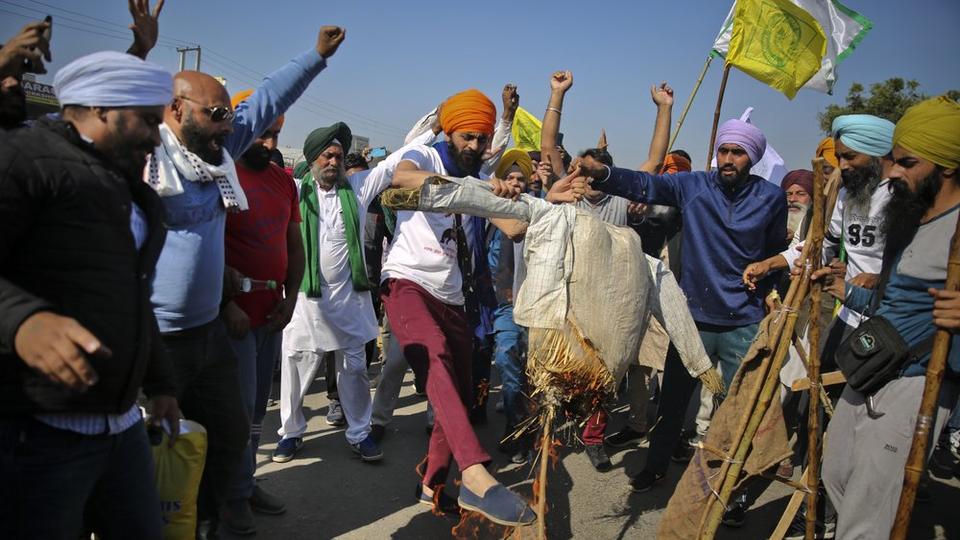
Protesting farmers burn an effigy of Indian Prime Minister Narendra Modi on a highway, refusing to move ahead unless they're allowed to proceed to their place of choice to protest, at the Delhi-Haryana state border in India on November 28, 2020 (AP)
A 65-year-old Sikh priest, Sant Baba Ram Singh, has committed suicide at one of the farmers protest sites in Indian capital New Delhi.
In his suicide note doing rounds on social media, Singh said he was "hurt to see the condition" of the protesting farmers.
His postmortem was done at a government hospital in Karnal district of his home state of Haryana.
Farmers have been protesting for nearly a month over the reforms, enacted in September, to deregulate the agriculture sector, allowing farmers to sell to buyers beyond government-regulated wholesale markets.
Blaming government apathy for Singh's suicide, opposition leader Rahul Gandhi said Prime Minister Narendra Modi's administration should immediately repeal the laws.
The reforms, contained in three laws, loosen rules around the sale, pricing and storage of farm produce, while farmers say that new rules threaten their livelihood.
Modi has tried to assure farmers the changes will bring them new opportunities but few have been convinced. Several rounds of talks between farm union leaders and the government have failed.
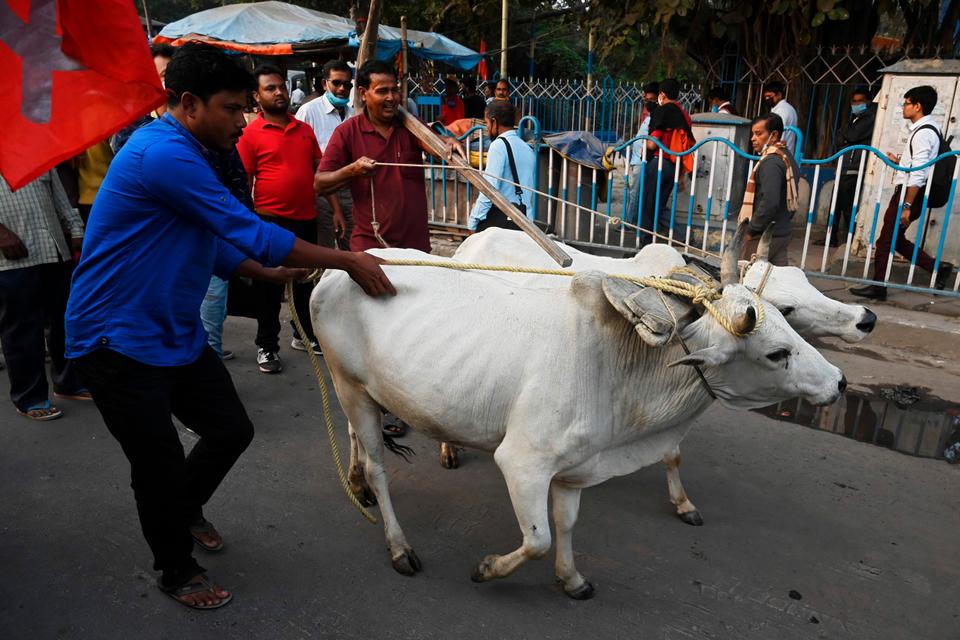
A 65-year-old Sikh priest, Sant Baba Ram Singh, has committed suicide at one of the farmers protest sites in Indian capital New Delhi.
In his suicide note doing rounds on social media, Singh said he was "hurt to see the condition" of the protesting farmers.
His postmortem was done at a government hospital in Karnal district of his home state of Haryana.
Farmers have been protesting for nearly a month over the reforms, enacted in September, to deregulate the agriculture sector, allowing farmers to sell to buyers beyond government-regulated wholesale markets.
Blaming government apathy for Singh's suicide, opposition leader Rahul Gandhi said Prime Minister Narendra Modi's administration should immediately repeal the laws.
The reforms, contained in three laws, loosen rules around the sale, pricing and storage of farm produce, while farmers say that new rules threaten their livelihood.
Modi has tried to assure farmers the changes will bring them new opportunities but few have been convinced. Several rounds of talks between farm union leaders and the government have failed.

Farmers and activists from various political groups, along with bulls, take part in a rally in support of farmers against the central government's recent agricultural reforms in Kolkata on December 16, 2020. (AFP)
Top court's offer to mediate
India’s Supreme Court on Wednesday offered to set up a mediation panel to end the three-week protest.
The court sent notices to the government and the farmers’ representatives across the country seeking their views on the proposal and set on Thursday as the date for a possible decision.
Earlier, Chief Justice S.A. Bobde and Justices A.S. Bopanna and V. Ramasubramanian made the offer to set up the panel after five rounds of talks failed to end the impasse between the government and farmers.
“Your negotiations with protesting farmers have not worked apparently until now,” the Press Trust of India news agency cited the judges as telling government Solicitor-General Tushar Mehta.
READ MORE: India's farmers defiant despite Modi assurance
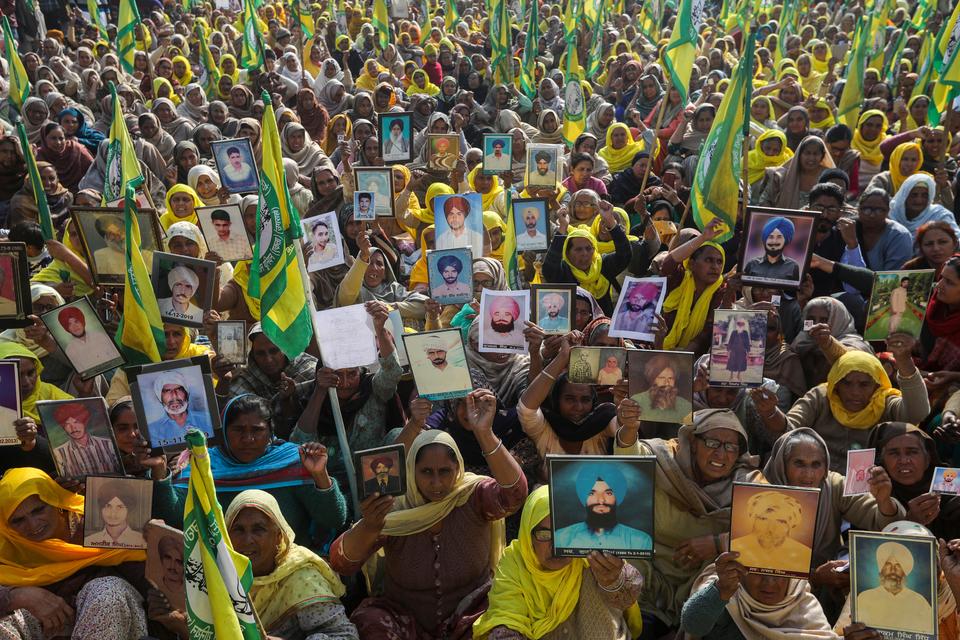
Women, including widows and relatives of farmers who were believed to have killed themselves over debt, attend a protest against farm bills passed by India's parliament, at Tikri border near Delhi, India on December 16, 2020. (Reuters)
India's 'invincible' women join protests
Legions of women have trekked to India's capital to join the farmer's protests, hoping not only to protect their livelihoods but also win visibility as farmers.
About 75 percent of rural women in India who work full-time are farmers, Oxfam says, with numbers rising as men migrate to work in factories and construction sites. Yet farming is still widely seen as men's work and only 13 percent of women own the land they till.
"Women are never counted as farmers ... we are always counted as housewives, but not workers," said Sunita Rani, 39, who owns a farm of less than an acre in northern Haryana state and joined the protests on New Delhi's border a fortnight ago.
"More women work as farmers than men, but their work is not seen as equal. This is a major national protest and I joined it so people know that we are also farmers," Sunita told the Thomson Reuters Foundation by phone.
Globally, more than 400 million women farm, yet only about 15% of farmland is owned by women, according to Landesa, a global land rights organisation, with many women doing unpaid work on family farms or as casual labourers.
In order to support women farmers, the government has spent billions of rupees on an empowerment scheme and provides training on agricultural techniques and support to find markets.
READ MORE: Indian government offers concessions as farmers intensify protests
Identity battle
But much remains to be achieved on the ground.
"We work from 7am to 5pm on the field, tilling the soil, cultivating, fencing fields but our contribution is not considered ... not a single woman in my village has land ownership," said 27-year-old Kavita Kumari.
Kumari was among hundreds of women farmers and farm workers who travelled for 15 hours in trucks from central Madhya Pradesh state to national highways bordering New Delhi where thousands are camping as entry to the city is barred.
"I have been a farmer since I was a child ... I can ride a bike, and a tractor. People will see if we can come forward for protests, we can also do farming," she said.
Women farmers have taken to the stage during the protests to oppose the new legislation.
"It matters to them to voice their thoughts and perspective on these laws," said Kavitha Kuruganti, convener of Alliance for Sustainable and Holistic Agriculture, a coalition of farmer groups taking part in the protests.
"Yet tens of thousands remain invisible even now.
It was not possible for men to participate (in the protests) if women were not doubling up back home and taking on the role of men who are here."
Visibility at the protest site, however, might not help women win their identity battle, since the protests are not about their rights, some campaigners said.
"They have always cultivated the land but never been called cultivators. They even get paid less (as farmer labourers) for the work they do," said Jai Singh, founder of Punjab-based charity Volunteers for Social Justice.
"The voices of women you hear at these protests are still very much from the margins.
Change for them will need a different venue and a different protest."
India's 'invincible' women join protests
Legions of women have trekked to India's capital to join the farmer's protests, hoping not only to protect their livelihoods but also win visibility as farmers.
About 75 percent of rural women in India who work full-time are farmers, Oxfam says, with numbers rising as men migrate to work in factories and construction sites. Yet farming is still widely seen as men's work and only 13 percent of women own the land they till.
"Women are never counted as farmers ... we are always counted as housewives, but not workers," said Sunita Rani, 39, who owns a farm of less than an acre in northern Haryana state and joined the protests on New Delhi's border a fortnight ago.
"More women work as farmers than men, but their work is not seen as equal. This is a major national protest and I joined it so people know that we are also farmers," Sunita told the Thomson Reuters Foundation by phone.
Globally, more than 400 million women farm, yet only about 15% of farmland is owned by women, according to Landesa, a global land rights organisation, with many women doing unpaid work on family farms or as casual labourers.
In order to support women farmers, the government has spent billions of rupees on an empowerment scheme and provides training on agricultural techniques and support to find markets.
READ MORE: Indian government offers concessions as farmers intensify protests
Identity battle
But much remains to be achieved on the ground.
"We work from 7am to 5pm on the field, tilling the soil, cultivating, fencing fields but our contribution is not considered ... not a single woman in my village has land ownership," said 27-year-old Kavita Kumari.
Kumari was among hundreds of women farmers and farm workers who travelled for 15 hours in trucks from central Madhya Pradesh state to national highways bordering New Delhi where thousands are camping as entry to the city is barred.
"I have been a farmer since I was a child ... I can ride a bike, and a tractor. People will see if we can come forward for protests, we can also do farming," she said.
Women farmers have taken to the stage during the protests to oppose the new legislation.
"It matters to them to voice their thoughts and perspective on these laws," said Kavitha Kuruganti, convener of Alliance for Sustainable and Holistic Agriculture, a coalition of farmer groups taking part in the protests.
"Yet tens of thousands remain invisible even now.
It was not possible for men to participate (in the protests) if women were not doubling up back home and taking on the role of men who are here."
Visibility at the protest site, however, might not help women win their identity battle, since the protests are not about their rights, some campaigners said.
"They have always cultivated the land but never been called cultivators. They even get paid less (as farmer labourers) for the work they do," said Jai Singh, founder of Punjab-based charity Volunteers for Social Justice.
"The voices of women you hear at these protests are still very much from the margins.
Change for them will need a different venue and a different protest."
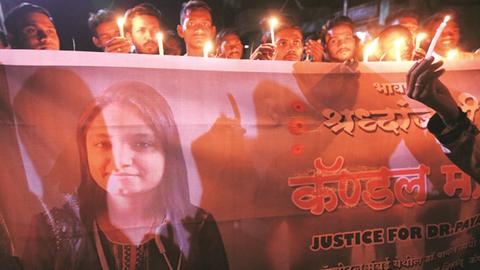

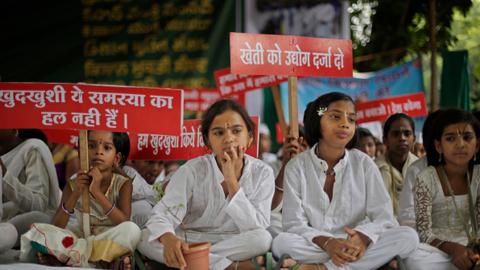
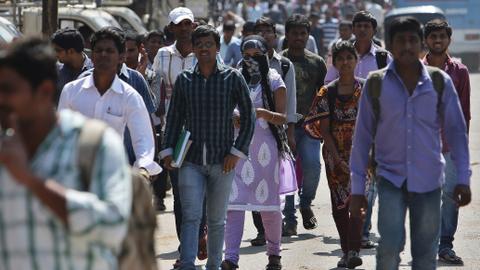
No comments:
Post a Comment